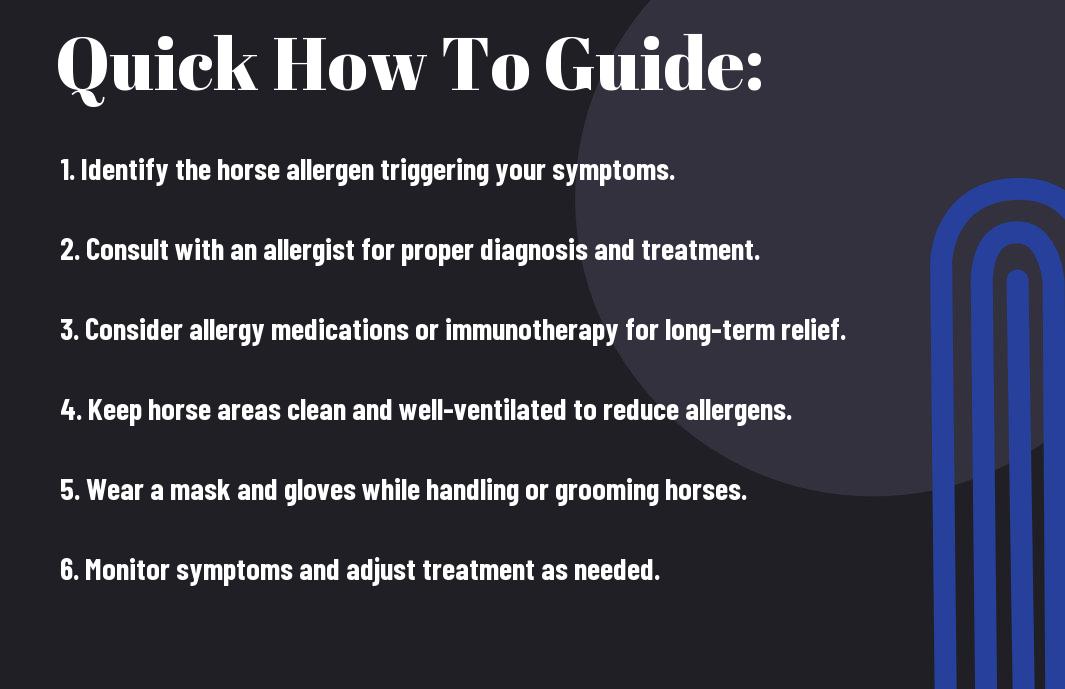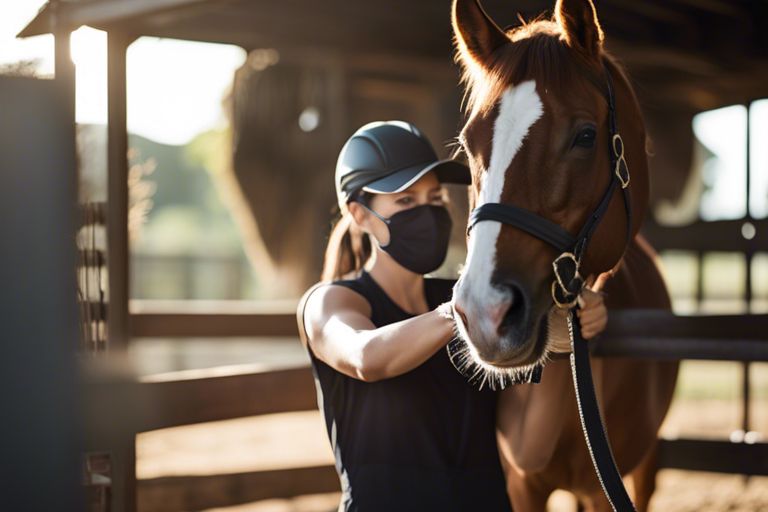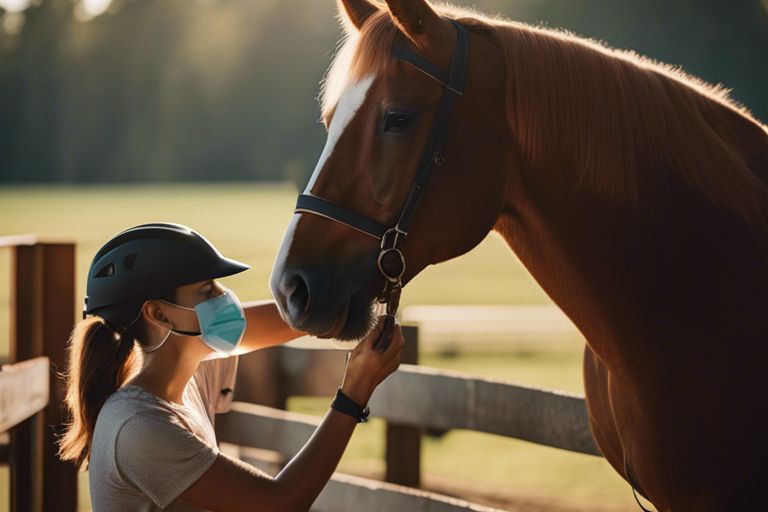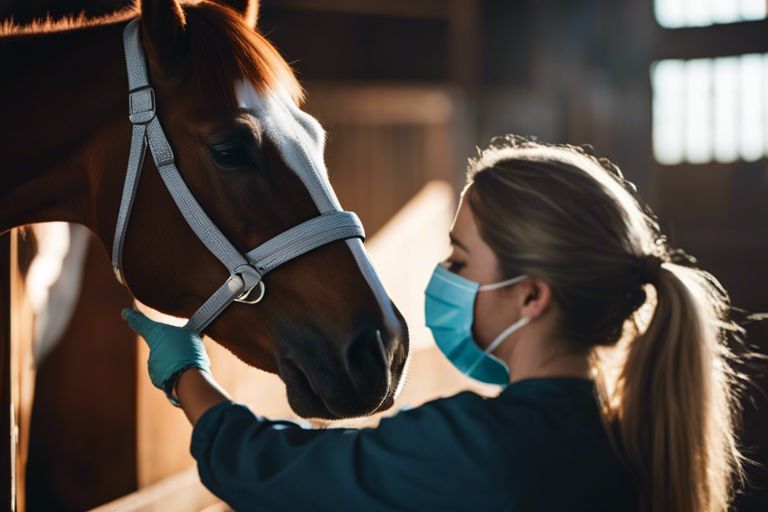This guide will help you learn how to effectively manage your horse allergies. As a horse lover, it can be challenging to deal with allergic reactions that can arise from horses. However, by following the tips and tricks outlined in this post, you can minimize your symptoms and continue to enjoy your time with your beloved equines.

Understanding Horse Allergies
What are Horse Allergies?
The first step in managing horse allergies is understanding what they are. Horse allergies are hypersensitive reactions to proteins found in a horse’s dander, hair, urine, and saliva. When you come in contact with these allergens, your immune system mistakenly identifies them as harmful invaders and triggers an allergic reaction.
Common Symptoms of Horse Allergies
On average, horse allergies can cause a variety of symptoms in individuals who are sensitive to them. These symptoms may include sneezing, coughing, watery eyes, nasal congestion, wheezing, and skin rashes. In severe cases, exposure to horse allergens can lead to asthma attacks in susceptible individuals.
This is why it’s imperative to recognize the signs of horse allergies and seek appropriate treatment to avoid serious health complications.
Who is at Risk of Developing Horse Allergies?
Even if you have never experienced allergies before, you could still develop horse allergies if you spend a significant amount of time around horses. People who work in stables, grooming horses, or participating in horseback riding are at a higher risk of developing allergies to these majestic animals.
Common risk factors for developing horse allergies include a family history of allergies, existing respiratory conditions like asthma, and a weakened immune system. If you fall into any of these categories, it’s crucial to be mindful of your exposure to horse allergens to prevent allergic reactions.

Factors Contributing to Horse Allergies
Clearly, horse allergies can be triggered by various factors. Understanding what contributes to these allergies can help you better manage and prevent them. Here are some key factors to consider:
Environmental Factors
With environmental factors, things like hay, straw, horse dander, and pollen can all be potential triggers for your allergies. These allergens can be present in the horse’s living environment or in areas where they frequently roam. Additionally, mold spores from damp hay or bedding can also exacerbate your allergy symptoms. Perceiving and minimizing exposure to these environmental triggers can help reduce your allergic reactions.
- hay
- straw
- horse dander
- pollen
- mold spores
Though avoidance of allergens may be challenging, taking precautions like wearing a mask while grooming or cleaning the stable, and ensuring proper ventilation where the horse is kept, can help reduce your exposure. Do not forget, even small changes in the environment can make a big difference in managing your horse allergies.
Genetic Predisposition
Any genetic predisposition to allergies can also play a role in your susceptibility to horse allergies. If other members of your family have allergies, there is a higher likelihood that you may develop them as well. Predisposition to allergies can manifest in various forms, making you more sensitive to allergens present in your horse’s environment.

How to Diagnose Horse Allergies
Physical Examination
Now, when trying to diagnose horse allergies, the first step is a physical examination of your horse. A veterinarian will carefully inspect your horse for any signs of allergic reactions such as skin inflammation, hives, nasal discharge, or eye irritation. They will also ask you detailed questions about the horse’s symptoms and medical history to get a comprehensive understanding of the situation.
Allergy Testing
Diagnosing horse allergies may require **allergy testing** to pinpoint the specific allergen causing the reaction. This can involve skin testing where small amounts of common allergens are injected under your horse’s skin to observe any reactions. Blood tests can also be conducted to measure the horse’s immune response to different allergens.
Allergies can manifest in various ways, and testing will help identify the exact triggers so that a targeted treatment plan can be developed for your horse’s specific allergy profile.
Elimination Diet
Elimination diets can also aid in diagnosing horse allergies. By **eliminating** certain ingredients from your horse’s diet and gradually reintroducing them while monitoring for allergic reactions, you can identify food allergies or sensitivities that may be contributing to the symptoms.
Another important aspect of diagnosing horse allergies is **being proactive** and **working closely** with your veterinarian to conduct the necessary tests and observations. **Identifying** and **addressing** horse allergies early can significantly improve your horse’s quality of life and prevent any potential complications.
Tips for Managing Horse Allergies
Allergies to horses can be a real challenge, but there are several ways you can manage your symptoms and still enjoy spending time around these magnificent animals. Here are some tips that can help you navigate your horse allergies:
Avoiding Exposure
If you have horse allergies, it’s important to limit your exposure to the allergens as much as possible. This means staying away from areas where horses are kept, such as barns or stables. If you do have to be around horses, wearing a mask can help reduce your chances of inhaling allergens. Additionally, make sure to wash your hands and change your clothes after being around horses to prevent allergens from spreading.
This way, you can minimize the amount of allergens that come into contact with your body and reduce your risk of experiencing symptoms.
Medications and Treatments
On top of avoiding exposure, there are medications and treatments that can help manage your horse allergies. Antihistamines can be useful for relieving symptoms such as sneezing, itching, and hives. Nasal corticosteroids can help reduce nasal inflammation and congestion, while decongestants can alleviate a stuffy nose. Immunotherapy, also known as allergy shots, is another option for long-term management of horse allergies.
Keep in mind that it’s important to consult with your healthcare provider before starting any new medication or treatment plan for your horse allergies. They can help you find the best approach to managing your symptoms based on your individual needs and medical history.
Immunotherapy
Now, let’s dive deeper into immunotherapy. This treatment involves receiving regular injections of allergens to help your body build up immunity over time. Immunotherapy can be highly effective in reducing the severity of horse allergies and in some cases, can lead to a significant decrease in symptoms or even complete relief.
By gradually exposing your body to allergens, immunotherapy can desensitize your immune system and decrease your allergic response to horses. This can be a long-term solution for managing your horse allergies and improving your quality of life.

Creating an Allergy-Friendly Environment
Many allergies in horses are triggered by environmental factors such as dust, mold, and pollen. To manage horse allergies effectively, it’s important to create an allergy-friendly environment that minimizes these triggers. This can be achieved through proper cleaning and disinfecting routines, reducing dust and dander, and improving ventilation in the barn.
Cleaning and Disinfecting
Reducing Dust and Dander
Assuming you want to reduce dust and dander in your horse’s environment, consider using dust-free bedding such as pelleted paper or rubber mats instead of traditional straw or hay. Regularly clean and dampen the areas where your horse spends time to minimize airborne particles. Additionally, **using a **gravel base in high-traffic areas can help decrease dust levels.
Improving Ventilation
There’s a **direct correlation** between poor ventilation and increased allergens in the air. **Having** proper airflow in the barn can help reduce the concentration of dust and irritants that can trigger allergies in your horse. **Installing** fans or vents can assist in circulating fresh air and reducing stagnant air pockets where allergens accumulate.
To **enhance** ventilation further, consider **opening** windows and doors whenever possible to allow for natural airflow. **Additionally**, creating a cross-breeze by strategically placing fans can help improve air circulation within the barn. **By implementing these measures**, you can create a **healthier environment** for your allergic horse.
How to Prevent Horse Allergies
Early Exposure
Not all allergies can be prevented, but there are some strategies that may help reduce the risk of developing horse allergies. Assuming that you or someone in your family is at risk of developing allergies, early exposure to horses may help build tolerance and reduce the likelihood of an allergic reaction later in life. If possible, try to introduce horses into your environment early on to help your body acclimate to their presence.
Building Immunity
The immune system plays a crucial role in how your body reacts to allergens. The key to preventing horse allergies lies in building a strong immune system. It is important to maintain a healthy lifestyle, eat a balanced diet, exercise regularly, and get enough rest to support your immune system’s function. Additionally, consider incorporating immune-boosting supplements, such as vitamin C and probiotics, into your daily routine to strengthen your body’s defenses against allergens.
Healthy Horse Care Practices
On top of building immunity, immunity can be supported by implementing healthy horse care practices. This includes keeping your horse’s living environment clean and well-ventilated, minimizing dust and allergens in their living space. Regular grooming and bathing of your horse can also help reduce the amount of dander present, decreasing the likelihood of triggering allergic reactions in you or others around the horse.
To wrap up
Hence, managing horse allergies requires a combination of preventive measures and treatment options. By keeping your horse’s living environment clean, using proper grooming techniques, and consulting with a veterinarian to determine the best course of action, you can help alleviate allergy symptoms in your horse.
Remember to monitor your horse closely for any signs of discomfort or respiratory issues, and continue to adjust your management strategies as needed. With diligence and care, you can ensure that your horse stays healthy and happy despite having allergies.
Q: What are common symptoms of horse allergies?
A: Common symptoms of horse allergies include sneezing, runny or stuffy nose, itchy or watery eyes, coughing, wheezing, chest tightness, and skin rash or hives.
Q: How can horse allergies be diagnosed?
A: Horse allergies can be diagnosed through skin prick tests, blood tests for specific antibodies, or allergen-specific immunoglobulin E (IgE) tests.
Q: How can horse allergies be managed?
A: Managing horse allergies involves minimizing exposure to horses, using allergy medications such as antihistamines or nasal corticosteroids, and considering allergy shots (immunotherapy) for long-term relief.
Q: Are there specific breeds of horses that are considered hypoallergenic?
A: While no horse breed is truly hypoallergenic, some horse breeds such as the American Curly Horse or the Bashkir Curly Horse are known to produce less dander and may be better tolerated by individuals with allergies.
Q: Can horse allergies lead to severe reactions such as anaphylaxis?
A: In rare cases, horse allergies can trigger severe reactions such as anaphylaxis, which is a life-threatening allergic reaction requiring immediate medical attention. It is important for individuals with severe allergies to horses to carry an epinephrine auto-injector at all times.











